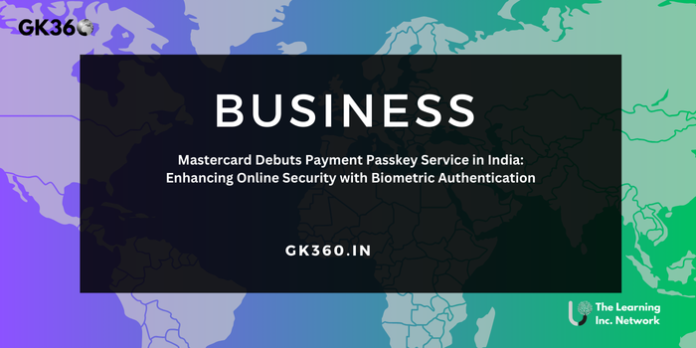Mastercard Launches Payment Passkey Service in India: A New Era in Digital Payment Security
Introduction
Mastercard has introduced its Payment Passkey Service in India, marking a major step toward enhancing online payment security and user convenience. Launched at the Global Fintech Fest in Mumbai, this innovative service replaces traditional passwords and OTPs with biometric authentication, such as fingerprint and facial recognition.
With online fraud in India surging by 300% over the past two years, Mastercard’s initiative aims to fortify digital transactions while simplifying the user experience.

Table of Contents
- The Need for Stronger Digital Payment Security
- Key Features of Mastercard’s Payment Passkey Service
- Collaboration with Indian Payment Leaders
- Aligning with India’s Digital Payment Goals
- Mastercard’s Vision for a Tokenized Future
- FAQs
- Conclusion & Call to Action
The Need for Stronger Digital Payment Security
- Rising cases of online fraud have increased the need for robust security measures.
- Traditional methods like passwords and OTPs are vulnerable to phishing attacks, SIM swapping, and data breaches.
- Mastercard’s biometric authentication system offers a more secure and seamless alternative for online shoppers and digital payments.
Key Features of Mastercard’s Payment Passkey Service
1. Biometric Authentication
- Uses fingerprint or facial recognition instead of passwords and OTPs.
- Provides a frictionless payment experience while maintaining high security.
2. Tokenized Payment Process
- Ensures sensitive payment details are never shared directly with merchants.
- Reduces data exposure risks and strengthens security against fraud.
3. Real-Time Fraud Prevention
- By leveraging AI-driven risk analysis, transactions are monitored in real-time.
- Suspicious activities are flagged and mitigated instantly, enhancing consumer protection.
Collaboration with Indian Payment Leaders
- Mastercard has piloted this service with top Indian payment platforms, including:
- Juspay
- Razorpay
- PayU
- Axis Bank
- These partnerships have helped fine-tune the service to meet the needs of Indian consumers and merchants.
- With India’s digital payments market projected to reach $254.60 billion by 2024, securing transactions is critical to fostering trust and growth.
Aligning with India’s Digital Payment Goals
- The Reserve Bank of India (RBI) has consistently pushed for a secure and resilient payment ecosystem.
- Mastercard’s service aims to reduce cart abandonment rates by eliminating complex authentication steps.
- Partners like Axis Bank and Juspay anticipate higher payment success rates and improved user satisfaction.
Mastercard’s Vision for a Tokenized Future
- Mastercard’s Payment Passkey Service aligns with global security standards, including:
- EMVCo – Ensuring secure payment transactions worldwide.
- FIDO Alliance – Promoting password-free authentication.
- Tokenization technology replaces sensitive card details with unique identifiers, making payments safer.
- As cyber threats evolve, Mastercard’s tokenized ecosystem ensures users are protected from data breaches and fraudulent activities.

FAQs
1. What is Mastercard’s Payment Passkey Service?
It is a biometric authentication service that replaces passwords and OTPs with fingerprint or facial recognition for secure digital payments.
2. Why is this service important for Indian consumers?
With online fraud increasing by 300% in two years, this service provides a safer and more convenient way to authenticate transactions.
3. Which Indian companies are partnering with Mastercard?
Mastercard is working with Juspay, Razorpay, PayU, and Axis Bank to integrate this service into India’s digital payment landscape.
4. How does tokenization improve payment security?
Tokenization replaces sensitive payment information with a unique identifier or token, reducing the risk of data theft during transactions.
5. How does this align with India’s digital payment goals?
The service aligns with RBI’s vision for a secure payment ecosystem, aiming to reduce fraud, improve transaction efficiency, and enhance user trust.
Conclusion & Call to Action
Mastercard’s Payment Passkey Service is a game-changer for India’s digital payment landscape. By replacing passwords and OTPs with biometric authentication, this initiative significantly enhances security, convenience, and user trust.
🔹 As India moves towards a cashless economy, innovations like this will play a pivotal role in ensuring safe and seamless digital transactions.
💳 Stay informed and embrace the future of secure payments! 🔐🚀
Key Takeaways
| Aspect | Details |
|---|---|
| Service Launched By | Mastercard |
| Launch Event | Global Fintech Fest, Mumbai |
| Technology Used | Biometric authentication & tokenization |
| Indian Partners | Juspay, Razorpay, PayU, Axis Bank |
| Security Enhancement | Replaces passwords & OTPs with facial and fingerprint recognition |
| Impact on Digital Payments | Reduces fraud, speeds up transactions, aligns with RBI’s security goals |
Relative Terms
- Mastercard Payment Passkey India 2025
- Biometric Authentication for Digital Payments
- India’s Digital Payment Security Innovations
- Mastercard Fintech Launch in India
- Online Payment Fraud Prevention India
- RBI Secure Payment Guidelines 2025
- Juspay Razorpay PayU Mastercard Partnership
- Future of Passwordless Digital Payments
- Tokenization in Indian Digital Transactions
- AI-Powered Fraud Detection in Online Payments





